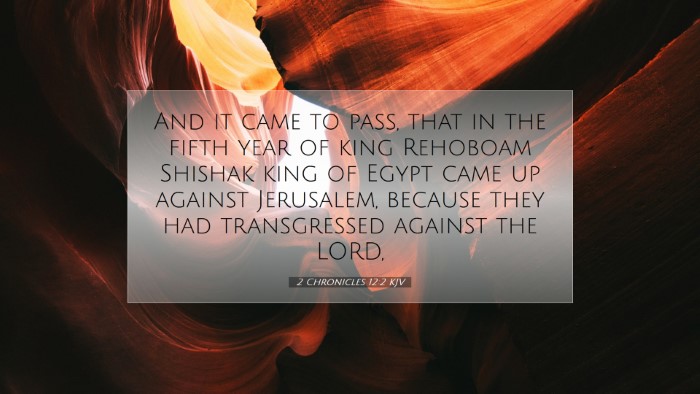2 Chronicles 12:2 states: "And it came to pass, that in the fifth year of king Rehoboam, Shishak king of Egypt came up against Jerusalem."
Introduction
The passage of 2 Chronicles 12:2 marks a significant turning point in the reign of Rehoboam, son of Solomon, illustrating the consequences of turning away from God and the ensuing political ramifications. This commentary draws from esteemed public domain sources such as Matthew Henry, Albert Barnes, and Adam Clarke to elucidate the theological and historical implications of this event.
Historical Context
This verse is situated in a historical context characterized by the waning power of Israel and the rise of external threats. The specific mention of Shishak, a pharaoh of Egypt, indicates a pivotal moment where foreign adversaries now seek to reclaim their influence over Israel, demonstrating the tenuous nature of Israel's security in light of divine displeasure.
Rehoboam's Reign
Rehoboam's leadership began with promise but quickly deteriorated due to his poor decisions. As highlighted by Matthew Henry, his foolishness in listening to unwise counselors led him to harshly rule over the people, which sowed discord and division within the kingdom.
Shishak's Campaign
Albert Barnes comments on the ambition of Shishak, noting that his invasion symbolizes the broader geopolitical struggles of the time. The motive behind Shishak's campaign was likely to reinforce Egypt's waning power post-Solomon and to subjugate Israel as a demonstration of might.
Theological Insights
This verse encapsulates critical theological themes relevant for pastors and theologians:
- Divine Judgment: The invasion of Shishak is understood as a manifestation of God’s judgment upon Rehoboam and the nation. As Adam Clarke posits, the Lord had delivered them into the hands of their enemies when they abandoned His commandments.
- The Importance of Obedience: The shift in Rehoboam's reign delineates the consequences of disobedience. Faithfulness to God is crucial for national stability, and the departure from His laws invites calamity.
- Pride Precomes Before Fall: Rehoboam's pride and arrogance in rejecting counsel lead directly to his downfall and foreign oppression, a warning for leaders to seek humility and wisdom.
Lessons for Leaders and Believers
The implications of this verse extend beyond the immediate historical context into practical lessons for contemporary leaders and believers:
- Seek Wise Counsel: Both Henry and Barnes stress the importance of seeking godly advice. The church today should be cautious of who they listen to when making decisions.
- Prioritize Relationship with God: The pivotal cause of Rehoboam’s troubles was the abandonment of God’s statutes. Modern believers must prioritize their relationship with God to avert similar calamities.
- Recognize the Role of Accountability: Rehoboam’s isolated leadership led to stubbornness. Effective leaders today need to foster an environment of accountability and openness.
Conclusion
2 Chronicles 12:2 serves as a sobering reminder of the consequences of turning away from God. The narrative surrounding Rehoboam’s reign highlights themes of divine judgment, the importance of wisdom, and the consequences that follow disobedience. For scholars, pastors, and believers, this passage invites reflection on leadership qualities, humility, and the imperative to remain steadfast in faith amidst external pressures.


